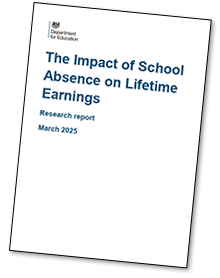A Useful Contribution to One Aspect of the Conversation on School Attendance
Posted: 07 May 2025

In March 2025, the UK Department for Education (DfE) released a report titled The Impact of School Absence on Lifetime Earnings. The research highlights a stark message: missing school during secondary years may carry long-term economic costs, particularly in the form of reduced earnings in adulthood.

"For each additional day of absence between years 7 to 11, the typical pupil could miss out on an average of £750 in future lifetime earnings."
DfE Blog, March 2025
Left: Graphic released by DfE on social media, March 2025
The report draws on large national datasets and employs two methods. One linking absence to academic attainment, and another directly linking absence to earnings at age 28. This dual approach lends weight to the analysis and positions it as a credible, data-driven input to the policy conversation.
For educators, the connection between attendance and academic performance is well established. What this report adds is a longer-term perspective, suggesting that absence can also affect financial outcomes much later in life. This framing may help reinforce the message that attendance matters, not just for GCSE results, but for life beyond school.
That said, the findings should be viewed through a critical lens. Absence is not always a matter of choice or poor motivation. It often reflects deeper challenges, mental health struggles, caring responsibilities, housing instability, or poverty, that the report does not fully explore. While the statistical link between absence and earnings is compelling, it cannot on its own tell the whole story.
Moreover, as the research comes from the Department for Education, which has a policy stake in reducing absenteeism, there is a risk that the findings are interpreted in a way that supports an existing agenda. The report itself is careful in tone, but its broader reception may oversimplify complex realities that educators deal with every day.
Still, this is a useful contribution to one aspect of the wider conversation about school attendance. It provides a fresh angle, particularly in terms of long-term economic outcomes and may help school leaders, teachers, and pastoral teams engage families in conversations about attendance with renewed urgency and evidence.
You can view and download the DfE’s document here: DfE: The Impact of School Absence on Lifetime Earnings.